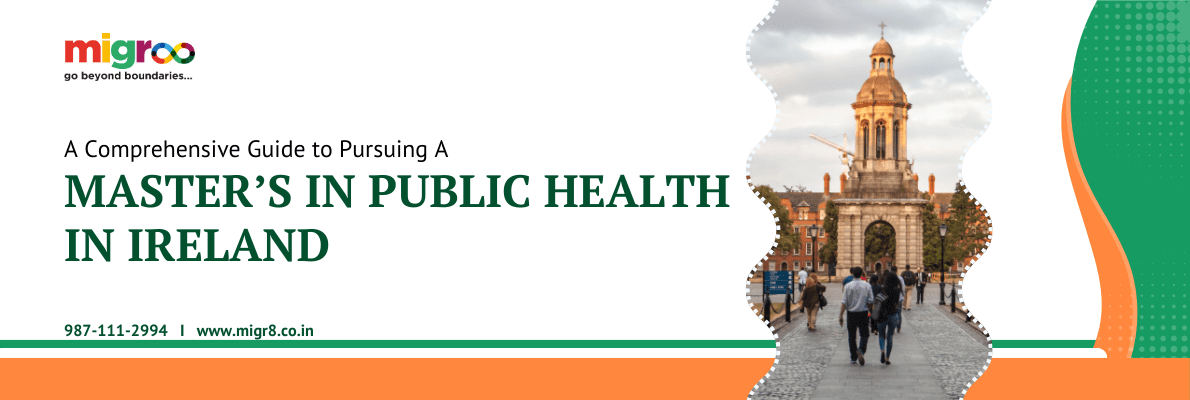As global health challenges continue to evolve, the demand for skilled public health professionals is on the rise. Ireland, with its robust education system and commitment to health innovation, is becoming a prime destination for those looking to pursue a Master’s in Public Health (MPH). This guide will provide you with everything you need to know about studying public health in Ireland, from program highlights to admission requirements, and career opportunities.
Why Choose Ireland for Your Master’s in Public Health?
1. High-Quality Education
Irish universities are renowned for their high academic standards and rigorous training. Institutions like Trinity College Dublin, University College Dublin, and the University of Galway offer MPH programs that are internationally recognized and accredited.
2. Diverse Learning Environment
Studying in Ireland gives you the chance to learn in a multicultural setting. With students from various backgrounds, you’ll benefit from a rich exchange of ideas and experiences, essential for understanding global public health issues.
3. Strong Public Health Focus
Ireland has a strong emphasis on health promotion and disease prevention. The Irish healthcare system, with its emphasis on community health initiatives, provides a unique opportunity to study real-world applications of public health theories.
Overview of MPH Programs in Ireland
Core Curriculum
Most MPH programs in Ireland cover essential topics such as:
- Epidemiology: Understanding the distribution and determinants of health-related states.
- Biostatistics: Applying statistical reasoning to public health.
- Health Policy and Management: Exploring the policies that govern health systems.
- Environmental Health: Assessing how environmental factors affect public health.
- Health Promotion: Strategies to promote health and prevent diseases.
Program Structure
Typically, MPH programs last 1 to 2 years, depending on whether you choose a full-time or part-time schedule. They often include a combination of coursework, practical experience, and a research project or thesis.
Specializations
Some universities offer specializations within the MPH, such as Global Health, Health Economics, and Health Promotion, allowing students to tailor their education to their career goals.
Admission Requirements
1. Educational Background
Most programs require a relevant undergraduate degree (e.g., in health sciences, social sciences, or biology). Some programs may also accept candidates with degrees in other fields if they can demonstrate a strong interest in public health.
2. Work Experience
While not always mandatory, relevant work experience in healthcare or public health can enhance your application. Many programs value practical experience as it enriches classroom discussions.
3. Language Proficiency
For non-native English speakers, proof of English language proficiency (e.g., IELTS or TOEFL scores) is typically required.
4. Application Process
The application process generally includes submitting an online application form, academic transcripts, a CV, a personal statement, and letters of recommendation. It’s important to check specific requirements for each university.
Financial Considerations
Tuition Fees
Tuition fees for international students can range from €10,000 to €30,000 per year, depending on the institution and the program. Domestic students usually pay lower fees.
Scholarships and Financial Aid
Many universities offer scholarships for international students, such as:
- Government of Ireland Scholarships
- University-specific scholarships
- Merit-based awards
It’s advisable to research and apply for these opportunities early in the application process.
Living in Ireland
Cost of Living
While tuition fees are a significant part of the budget, living expenses should also be considered. On average, students should budget around €800 to €1,500 per month for accommodation, food, transport, and leisure activities, depending on the city.
Accommodation
Students can choose from university-managed housing, private rentals, or shared apartments. It’s essential to explore options early, especially in cities like Dublin, where demand can be high.
Culture and Lifestyle
Ireland is known for its welcoming atmosphere, stunning landscapes, and rich cultural heritage. From vibrant cities to serene countryside, students will find numerous opportunities for exploration and leisure.
Career Opportunities
A Master’s in Public Health opens doors to various career paths, including:
- Public Health Educator: Develop and implement health education programs.
- Epidemiologist: Study disease patterns to inform public health strategies.
- Health Policy Analyst: Analyze and develop policies to improve health outcomes.
- Environmental Health Officer: Address health issues related to environmental factors.
- Global Health Consultant: Work with organizations to improve health standards worldwide.
Job Market
The demand for public health professionals is expected to grow in Ireland and globally, driven by increasing awareness of health issues and the need for effective health policies.
Conclusion
Pursuing a Master’s in Public Health in Ireland is a rewarding endeavor that prepares you to tackle some of the most pressing health challenges facing societies today. With high-quality education, a diverse cultural experience, and ample career opportunities, Ireland stands out as an ideal location for your studies. Whether you’re interested in research, policy-making, or community health, an MPH can be your gateway to a fulfilling career dedicated to improving public health outcomes.


